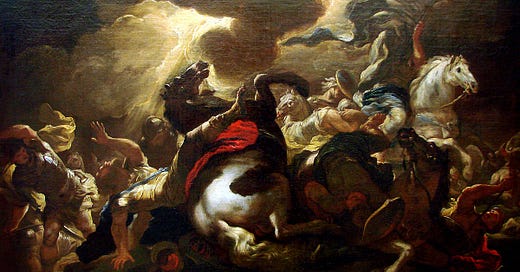A lot of today’s reflection stems from thoughts I had on storytelling in general, which I cover in my other Substack,
—Reading 1
Acts 22:3-16
Paul addressed the people in these words: “I am a Jew, born in Tarsus in Cilicia, but brought up in this city. At the feet of Gamaliel I was educated strictly in our ancestral law and was zealous for God, just as all of you are today. I persecuted this Way to death, binding both men and women and delivering them to prison. Even the high priest and the whole council of elders
can testify on my behalf. For from them I even received letters to the brothers and set out for Damascus to bring back to Jerusalem in chains for punishment those there as well.
“On that journey as I drew near to Damascus, about noon a great light from the sky suddenly shone around me. I fell to the ground and heard a voice saying to me, ‘Saul, Saul, why are you persecuting me?’ I replied, ‘Who are you, sir?’ And he said to me, ‘I am Jesus the Nazorean whom you are persecuting.’ My companions saw the light but did not hear the voice of the one who spoke to me. I asked, ‘What shall I do, sir?’ The Lord answered me, ‘Get up and go into Damascus, and there you will be told about everything appointed for you to do.’ Since I could see nothing because of the brightness of that light, I was led by hand by my companions and entered Damascus.
“A certain Ananias, a devout observer of the law, and highly spoken of by all the Jews who lived there, came to me and stood there and said, ‘Saul, my brother, regain your sight.’ And at that very moment I regained my sight and saw him. Then he said, ‘The God of our ancestors designated you to know his will, to see the Righteous One, and to hear the sound of his voice; for you will be his witness before all to what you have seen and heard. Now, why delay? Get up and have yourself baptized and your sins washed away, calling upon his name.’”
Today, there are two optional first readings from Acts of the Apostles. One’s from chapter 9, and it tells the story of Paul’s conversion on the road to Damascus; the one above is from chapter 22, and it tells the story of Paul telling the story of Paul’s conversion on the road to Damascus.1
It would seem redundant, but the stories, as told by Luke and by Paul (as told by Luke) aren’t exactly the same. In the narrative version, Luke says the men with Paul were speechless because they heard a voice but didn’t see anyone. In Paul’s recounting above, he says “My companions saw the light but did not hear the voice of the one who spoke to me.” This discrepancy has bothered biblical scholars for years.
The New Atheist answer is that the contradictions proves it’s all made up, the Bible is a sham, and we should all just go home.
This is pretty silly. We’re talking about different chapters in the same book, written by the same person. Luke includes the conversion of Paul three times; he obviously thinks it’s important. He’s not going to make a continuity error.
So why are they different? The prevailing theory is slightly different implications of the same word in different contexts. “In the first passage, akouO is to be taken to mean ‘hear’ and phOnE is to be taken to mean ‘sound,’ while in the second passage, akouO is to be taken to mean ‘understand’ and phOnE is to be taken to mean ‘voice.’”
In other words, the companions heard something, but didn’t understand the words; they saw a light, but not a person.
This seems perfectly reasonable to me. But I, in my amateur way, have another explanation: one version is a third-person narrative, the other is first-person.
Luke interviewed many living witnesses, including Mary herself, in order to write his Gospel and Acts. The first version is as clear and factual as he could make it. Paul’s version is a different story, however.
In screenwriting classes, you’re taught to “show, not tell.” But as David Bordwell points out, you can show by telling. When Paul recounts his conversion to the mob in Jerusalem, we’re actually getting two lines of narrative at once: the conversion itself, and Paul’s perception of events.
He felt isolated, singled out. No one else in his group was blinded by the light, and no one else heard the voice. It doesn’t matter, from Paul’s perspective, if they heard something. What matters is that they didn’t perceive the words that he did.
So here he is, blind and alone, and what does he do? Asks his friends for help to take him to Damascus. And there, Paul’s story comes full circle. He meets Ananias, a devout observer of the law, just as Paul described himself at the start.
Paul should have felt a kinship with Ananias, but Ananias wasn’t like Paul. He wasn’t a persecutor of Christians; he was a Christian himself. Instead, Ananias brings Paul into the Christian family. Paul says “I regained my sight, and saw him.”
We get to feel Paul’s emotional catharsis because we hear him tell the story himself. We see it through his eyes. It’s different than straight reporting, but just as necessary.
Responsorial Psalm
117:1bc, 2
R. (Mark 16:15) Go out to all the world, and tell the Good News.
Praise the LORD, all you nations;
glorify him, all you peoples!
R. Go out to all the world, and tell the Good News.
For steadfast is his kindness toward us,
and the fidelity of the LORD endures forever.
R. Go out to all the world, and tell the Good News.
That’s it. That’s the whole Psalm. It’s the shortest one in the whole book of Psalms, which is presumably why the refrain is from today’s Gospel.
Universalism (“all you nations”) is a good topic on the day we celebrate Paul’s conversion. He’s the apostle to the gentiles, who convinced the rest of the church fathers to, you know, do what Jesus told them to do in today’s Gospel.
Alleluia
Jn 15:16
R. Alleluia, alleluia.
I chose you from the world,
to go and bear fruit that will last, says the Lord.
R. Alleluia, alleluia.
The Lord calls us, through Paul, to come to him. But we’re not supposed to leave the world. We’re supposed to go out into the world, just like Paul did. You’ve heard the Gospel! Great. Now spread it around!
Gospel
Mk 16:15-18
Jesus appeared to the Eleven and said to them: “Go into the whole world and proclaim the Gospel to every creature. Whoever believes and is baptized will be saved; whoever does not believe will be condemned. These signs will accompany those who believe: in my name they will drive out demons, they will speak new languages. They will pick up serpents with their hands, and if they drink any deadly thing, it will not harm them. They will lay hands on the sick, and they will recover.”
God wants everyone to be saved. That’s why he sent His only Son, and why he sent the apostles.
In contrast to that, the verse regarding baptism has caused much consternation over the centuries. What happens if you don’t get baptized? Are you going to Hell? Even babies?2
Well, Jesus doesn’t say, “If you’re not baptized, you will be condemned.” Which would’ve made sense, mirroring the first part of the sentence.3 But He specifically leaves out (lack of) baptism. So there must be something else going on here?
Luckily, as Catholics, we have the tradition of the Church as well as the Scripture itself. From Catholic Answers—
Yet Christians have also always realized that the necessity of water baptism is a normative rather than an absolute necessity. There are exceptions to water baptism: It is possible to be saved through “baptism of blood” (martyrdom for Christ) or through “baptism of desire” (that is, an explicit or even implicit desire for baptism).
Thus the Catechism of the Catholic Church states: “Those who die for the faith, those who are catechumens, and all those who, without knowing of the Church but acting under the inspiration of grace, seek God sincerely and strive to fulfill his will, are saved even if they have not been baptized” (CCC 1281; the salvation of unbaptized infants is also possible under this system; see CCC 1260–1, 1283).
Baptism is more than just pouring water on your head. It’s a change of heart and a commitment to God and the Church. That is what leads to salvation.
So what does snake handling have to do with anything?
Besides the symbolic reference to Satan, the point is that Jesus passes on his miracle-working to the Apostles, and subsequently, to the whole Church.
We are told to proclaim the Word to everyone, so that they do get baptized and receive in His saving grace.
This is where the theory of Limbo (which is not official Church doctrine) came from.






